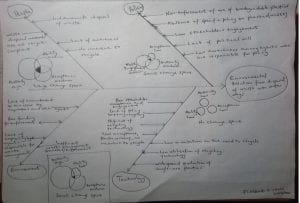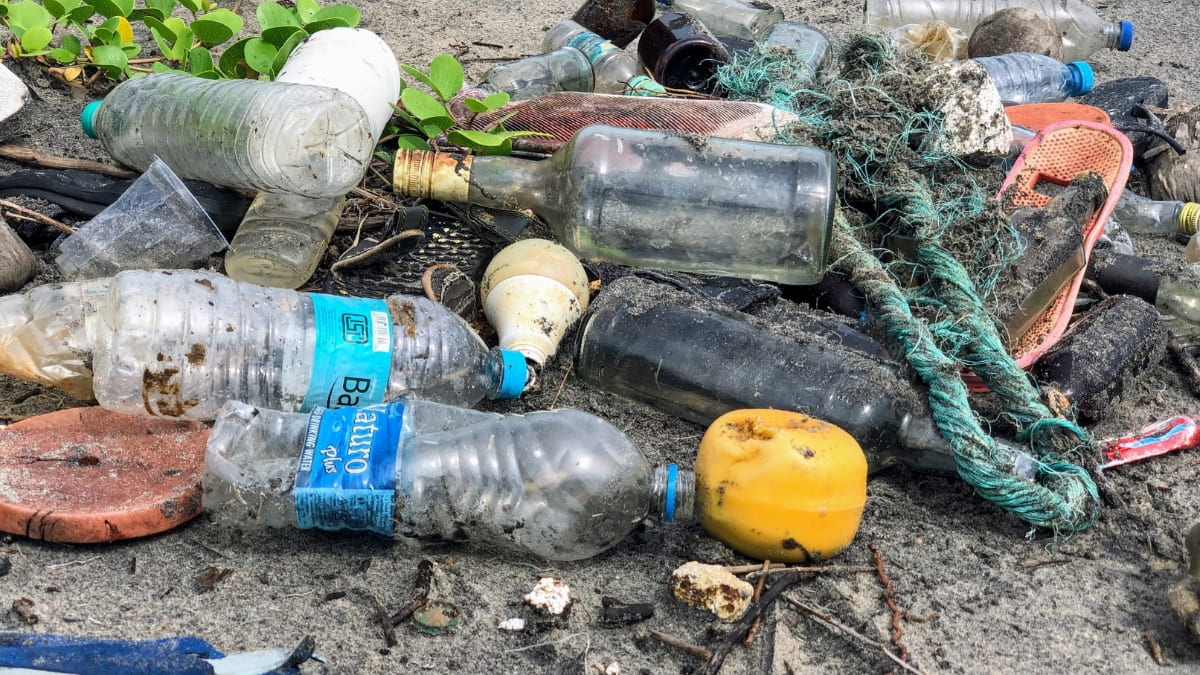Guest blog written by Emmanuel Adedeji Animashaun, Sedoten Agosa-Anikwe, Olumide Gregory Adeboye and Eriifeoluwa Fiyin Mofoluwawo
This is a team of development practitioners who work for the Lagos State Ministry of Environment and the Nigerian Institute of Social and Economic Research. They successfully completed the 15-week Practice of PDIA online course that ended in May 2019. This is their story.
The 15-week long PDIA course has finally come to an end. And it has been a time of multiple discoveries and intensive learning for Team Lagos Beat’s Plastic.
Emmanuel had learned about the course from course alumni, who explained the many advantages the course holds for practitioners in the public sector. He discussed this information with other people and selected individuals who displayed interest in learning a new approach. Together we formed Team Lagos Beat’s Plastic. Selecting a team of like-minded individuals is partially responsible for the team’s success. And this is one of the important lessons we learnt in the earlier weeks of the course.
Our team consists of 4 individuals from different backgrounds, but who are directly involved with work related to the environment. Thus, agreeing on a problem to solve was quite easy because waste management, and especially indiscriminate plastic disposal in Lagos waterways, was an issue that already ‘stared us in the face’. Hence, we started the course with the mindset of learning what is different about the Problem-Driven Iterative Adaptation (PDIA) approach, and what role it can play in solving the challenge we selected: plastic waste management in Lagos state, Nigeria. Plastic waste pollution/management is an issue that had not received the necessary attention from agents tasked with waste management. About 20% of total waste generated in Lagos is plastic, which suggests to us the (potential and) need for increased attention either for achieving a cleaner city or economic reasons (or both) if this problem is solved.
The Building State Capability book and other essential readings have been wonderful companions for our team. The first five weeks of the course involved individual work (assignments, reflections and graded discussions) in laying a foundation for the course and future teamwork. In those weeks, we all filled huge gaps in our knowledge of how change works. We also learnt about the big stuck faced by countries.
In those first few weeks, we learnt terms like administrative fact-fiction, isomorphic mimicry, transplantation, and premature load bearing. While these terminologies were new to us, their manifestations were not uncommon in our experience. And when we had completed the modules, we could easily identify these manifestations in various public sector interventions in our country, and outside (in literature). We also learnt that externally designed interventions cannot solve internal problems, where internal capabilities to implement and manage the solutions were low or absent. It was very surprising for us to discover that many of these (external) interventions were actually failing and the lesson for us was that throwing (only) money at a problem does not solve the problem (as we saw in the case of new country South Sudan which was a multi-billion dollar and multi-international agency intervention). And for our problem, we found an example of failed transplantation and isomorphic mimicry in existing waste management systems.
After the initial individual work phase, the group work phase began, and our ability to work as a team (plus what we have learned about teamwork, for example, team norms) was tested: we faced the hurdle of finding (generally) suitable times and location to meet for our discussions, and coordination of the group work. These were challenges we faced throughout the course, and this put us in a weekly flexible work mode (a sort of iterative adaptation). The latter challenge was because we had agreed in our team norms to allow a different teammate to coordinate. It became a challenge due to gaps in understanding the task requirements, and we solved this by complementing each other: we started our discussions with a deconstruction of task requirements to establish a baseline understanding for every teammate (we observed that the examiner requested a redo of our assignment each time we skipped this step). We solved the former through alternative channels of communication: phone calls, video calls and chats.
We had learned earlier that the typology of our problem was Policy-making, with some elements of logistics. The construction (followed by deconstruction) of our problem taught us the importance of proper problem identification, without which the solution is dead-on-arrival. Simply asking the ‘5 why’ questions put us on the path to getting a deeper understanding of the problem. Deconstructing the problem into smaller problems using the Fishbone diagram put us on the path to identifying and finding solutions to individual root causes. We then proceeded to analyzing the levels of Authority, Ability, and Acceptance for each sub-cause. This determined our potential entry points – what was more important to do: build authority, ability or acceptance. After learning about the importance of getting authorization to finding lasting solutions, we agreed that building acceptance is easier and important to getting that authorization in our context. We also agreed that we had no/low authority on some of the sub-causes. And with these lessons, we had the tools to design our first iteration. The PDIA approach culminated in action-learning: designing two iterations, separated by feedback periods, which are moments of reflection and adaptation of our action plans based on our findings and acceptance of contextual realities.

In conclusion, PDIA taught us the importance of people – the team, important relationships and multi-agent leadership – to achieving change in complex environments. A team of individuals with a common goal, who can leverage their relationships, is the first step to finding solutions. This team must efficiently navigate multiple levels of authority and authorizers to push through their goal. We have agreed to keep discussions ongoing about finding solutions to our problem (beyond the course). The PDIA journey has been a worthwhile experience – somewhat tough, but worthwhile. And we know that the knowledge we have gained from the course will make the difference in how we approach the task of seeking change: we will think big and small and do the little things which will lead to the emergence of big changes.
To learn more, visit our website or download the PDIAtoolkit (available in English and Spanish) or listen to our podcast.
